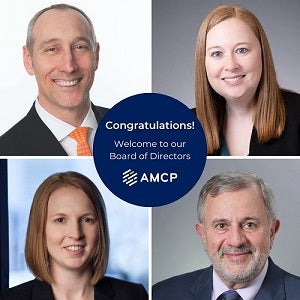2020-2021 AMCP Board of Directors Announced

Jeffrey, Rodriquez
AMCP welcomes the following officers to serve on the 2020-2021 Board of Directors: President-elect Paul L. Jeffrey, and Directors Jessica Daw, Pat Gleason, and Carly Rodriguez. The new board members, along with those continuing service — President Marissa Schlaifer, Immediate Past President Jim Kenney, Treasurer Christina Barrington, and Directors Jim Hopsicker and Vinson Lee — will be sworn in at AMCP 2020 in Houston, April 21-24, 2020.
Read the new board members' full biographies and candidate statements by clicking on the links below.
President-elect Paul L. Jeffrey, PharmD, is director of pharmacy at MassHealth, and associate professor of family medicine and community health at the University of Massachusetts Medical School Commonwealth Medicine Division. Jeffrey has served as president of two state societies of hospital pharmacy, and twice as chair of the regional Medicaid pharmacy association. He also has been a member of the AMCP Board of Directors, which he says “cemented my resolve to further serve this extraordinary association.” AMCP, Jeffery says, must continue its role as a conscientious voice in the deliberations concerning the optimal use of medications. “In the environment of high cost drugs and medical breakthroughs, AMCP has an obligation to re-direct and lead the conversation to a critical assessment of the value of medications,” he notes. He adds that AMCP is ideally positioned to bring together the diverse elements of managed care pharmacy and promote balance and equity between and among the stakeholders.
Director Jessica Daw, PharmD, MBA, is senior director of Clinical Pharmacy, at UPMC Health Plan. Daw says conversations around value should require outlining the scope and definition of value. Actionable plans related to value need to be differentiated from affordability and include a multi-stakeholder approach to defining outcomes and success, she notes. “The scope of what is considered value should be expanded to include not only the coverage of medications, but also other patient centric ways in which value can be addressed, including clinical programs and payment models.”
Director Pat Gleason, PharmD, BCPS, FCCP, FAMCP, is assistant vice president of Health Outcomes at Prime Therapeutics. Gleason says medication affordability and medication access are critically important public health issues. “Society and politicians are scrutinizing managed care and pharmaceutical manufacturers, declaring we are excessively profiting, causing medications to be unaffordable. We must accept the scrutiny and demonstrate how we are working together to ensure medications are priced to value, affordable and accessible,” Gleason says. “We need to work together, not point fingers.” He commends AMCP on their mission “to improve patient health by ensuring access to high-quality, cost-effective medications and other therapies” and also praises what we are about: “Leading the way to help patients get the medications they need at a cost they can afford”. AMCP recognizes the need to address medication price to value, affordability and access, Gleason explains. Now for the hard part: what can the Academy do to ensure actionable progress toward this goal?
Director Carly Rodriguez, PharmD, FAMCP, is pharmacy director of clinical innovation at Moda Health. Rodriguez notes that population health management is a growing area of interest and focus across nearly all segments of healthcare. Specifically, she explains that in order to identify, establish, and measure goals related to population health it is critical to understand all of the factors that contribute to healthcare trends. Population health programs require clinical, utilization, and cost data to be managed effectively. While many managed care pharmacy professionals may not be trained in conducting healthcare data analyses, being able to interpret these analyses and provide actionable recommendations is a skill critical to success in population health management.



